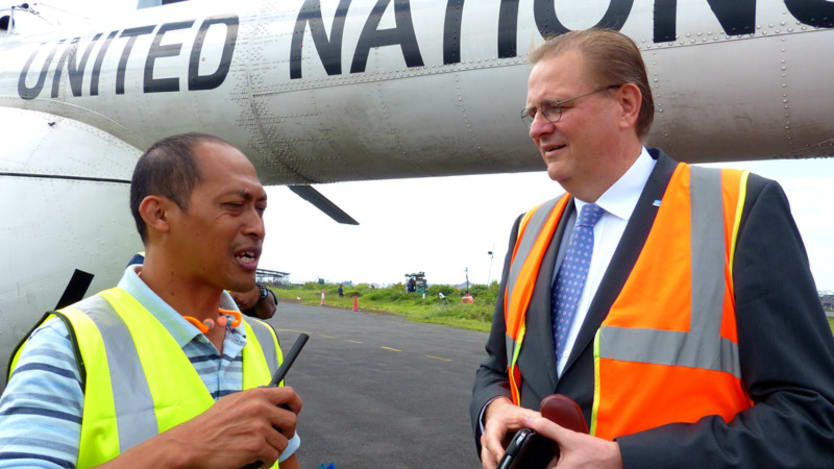
United Nations Volunteers tackles development challenges in every corner of the world — and the man who leads them has seen many of the problems himself.
Richard Dictus has worked with various U.N. agencies in a career spanning more than 25 years. He’s served in Malawi, Yemen, Sudan, Lesotho, Bangladesh, Pakistan, Fiji and at the U.N. headquarters in New York.
Devex talks to Dictus about why he believes volunteers can help lead the changes required to achieve the sustainable development goals. Below is an excerpt from that conversation.
The first proposed SDG is to “end poverty in all its forms everywhere.” How much of an effect can volunteers have on reducing poverty?
Poverty reduction cannot happen on the basis of government policy, public investment or private investment alone. Poverty is not about income poverty alone. Poverty is a multidimensional phenomenon that includes issues of education, health and opportunities.
Volunteering offers people new kinds of opportunities to acquire skills and to see new perspectives. And through volunteers doing different things, people see new possibilities. The impact of that self-actualization on the economic phenomenon of poverty is not very well understood. But it’s clear that only getting more income does not necessarily improve your life and does not necessarily improve your well-being. You need people who act as conduits to others, to change behaviors.
How important are volunteers in driving sustainable development?
More than 2,500 youth volunteers were mobilized in Guinea during the first 30 days of the Ebola crisis to convey the importance of personal hygiene and other things people could do to protect themselves. In Togo, 5,000 young people volunteer their skills and knowledge every year through a government-funded scheme to bolster social services in rural areas. These are two examples of how volunteers tackle some complicated problems.
Volunteers can also bring voices of people into the debate. The My World survey brought in 7 million voices of people from the most remote parts of the world. Volunteers took care to translate the survey into different tribal languages and took it to rural communities to make sure that even the most remote and sometimes most marginalized of people had a voice in the global debate.
That same way of giving people voices can now be extremely important in the process of localizing SDGs. Volunteers are there to make sure things get done even in situations that are extremely complicated, complex or where people are very difficult to reach.
How important is it that volunteers and others on the ground be aware of the SDGs?
Many of the sustainable development goals call for people to behave in a different manner. If you look at the Millennium Development Goals, the call behind HIV was for people to change their behavior on the most human of acts, sex. That required that a lot of volunteers live the change around sexual behavior themselves. But they were also willing to step out of their comfort zone and start explaining to other people why it is important to change their behavior, why it is important to practice safe sex, why it is important to have themselves tested, why it is important to use condoms.
The SDGs are asking for changes in the way people consume so that we can all live within planetary boundaries. Those changes cannot happen until and unless there are volunteers who are living those changes themselves and who are going out and not only advocating but helping other people to make the changes.
If we count exclusively on government policy, government investment and public investment to make things happen, we probably will not have enough resources to reach everybody. A very important principle of the SDGs is to leave no one behind. You cannot do that without volunteers.
How difficult will it be to measure progress?
We’re living in an era where information is lying on the streets. The traditional ways of capturing information, through statistical departments and things like that, are working really well but they are also relatively slow. If we want to see changes happening, we need to get used to picking up that information on the street and translating it into bundles of information that will drive change and hold duty-bearers accountable for the changes that have to be made.
We are looking at a data revolution. Information technology is a big enabler. And there are a large number of volunteers who are willing to collect the information and provide testimony of the changes that need to be made. This can become part of the way that a country plans and reviews its own progress.
What is one thing would you want people to take away from the discussion about the SDGs?
Leave no one behind. This is not just about including urbanization, climate change, environmental and planetary issues. It is about making sure we get everyone on board, that women are no longer being left behind, that issues that are the result of centuries, maybe millennia, of exclusion are finally turned around.
Young people, too, are quite often marginalized from political decision-making, are quite often marginalized in terms of economic processes. They suffer more from a lack of social services and a lack of access to employment opportunities than any other segment in society. If you have countries where you have 50 percent of youth being unemployed, you are sitting on a huge social cohesion issue. We have to make sure that we start including young people in the way that decisions are being made, in the way that decisions are being implemented, and in the way that our economies evolve.
There are tribal communities that are excluded. There are people with disabilities who are excluded. The sustainable development goals will only be deemed successful if these groups are fully engaged and have a voice in the way the sustainable development goals are implemented.
Sustaining Development is a three-month online series exploring the post-2015 development agenda hosted by Devex in partnership with Chevron, FXB, Global Health Fellows Program II, Philips, Pfizer, UNIDO, U.N. Volunteers and the U.S. Council for International Business. We will look at the practical steps needed to move the sustainable development goals from concept to reality. Visit the campaign site and join the conversation using #SustainDev.








